Living with pests can have a profound effect on your mental well-being. In this article, we will explore the psychological impact of pest infestations and shed light on the emotional toll it can take. From increased anxiety and stress to feelings of invasion and helplessness, understanding the psychological effects of pests is crucial for both your peace of mind and effective pest control. So, grab a cup of tea and let’s dive into the fascinating world of the psychological impact of pest infestations.
1. Fear and Anxiety
When faced with a pest infestation, it is common to experience fear and anxiety. This is primarily fueled by the fear of the unknown. The presence of pests in your home or property can create a sense of unease and uncertainty. You might find yourself constantly worrying about the extent of the infestation and the potential harm it can cause.
1.1 Fear of the unknown
The unknown nature of a pest infestation can be a major source of fear. You may not be aware of the type of pests invading your space, their behaviors, or the damage they can cause. This lack of information can leave you feeling anxious and on edge, continuously anticipating the worst-case scenario.
1.2 Anxiety about the extent of the infestation
Another aspect that contributes to fear and anxiety is the uncertainty surrounding the extent of the infestation. Questions such as “How widespread is the infestation?” and “How long has it been going on unnoticed?” can create a constant sense of unease. The fear of not knowing the full scope of the problem can be overwhelming, causing you to feel helpless and unsure about how to tackle it.
1.3 Fear of harm to health and property
One of the most significant fears associated with pest infestations is the potential harm they can cause to your health and property. Pests such as rodents, insects, and bed bugs can carry diseases and cause physical damage. The fear of contracting illnesses, suffering bites or stings, or dealing with the destruction of personal belongings and property can have a profound impact on your mental well-being.
2. Disgust and Revulsion
Pest infestations often elicit feelings of disgust and revulsion. The presence of pests in your living space can be repulsive, and dealing with their invasion can be emotionally challenging.
2.1 Repulsive nature of pests
Pests are generally considered unsightly and repugnant. Whether it’s the sight of rats scurrying across your kitchen floor or the presence of cockroaches crawling on your walls, the mere presence of these creatures can trigger a strong disgust response. The repulsive nature of pests can make you feel uncomfortable and make your living environment feel unclean and contaminated.
2.2 Feeling of contamination
The feeling of contamination is a common experience when dealing with pest infestations. You may constantly worry about the spread of germs, allergens, and diseases associated with pests. This feeling can be particularly unsettling, as it creates a persistent sense of being surrounded by filth and unhygienic conditions.
2.3 Disgust-driven behaviors
The strong feelings of disgust and revulsion caused by pest infestations can lead to specific behaviors. For example, you may find yourself constantly cleaning and disinfecting your living space, trying to eliminate any traces of pests and their associated filth. Additionally, you may become hyper-vigilant about sealing off entry points and taking extra precautions to prevent further infestations.
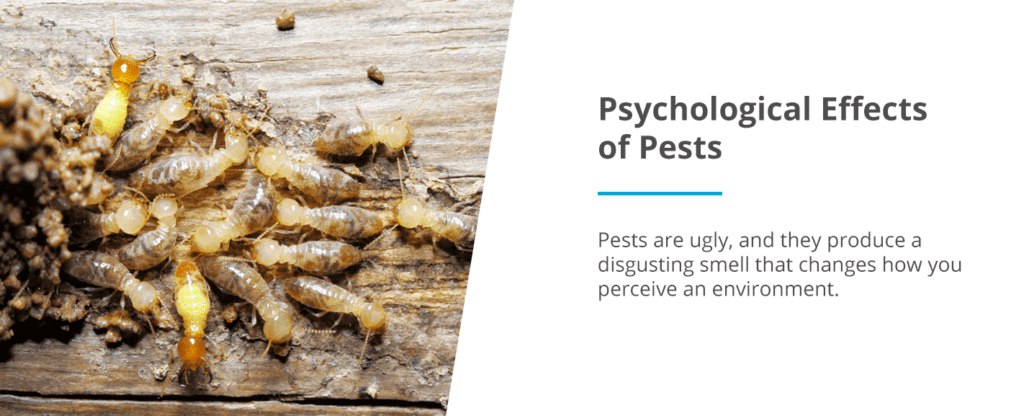
3. Sleep Disturbances
Pest infestations can significantly disrupt your sleep patterns, leading to various sleep disturbances.
3.1 Nightmares and vivid dreams
The stress and anxiety caused by pest infestations can manifest in your sleep, leading to nightmares and vivid dreams. These dreams may depict scenarios related to the infestation, such as being swarmed by pests or waking up to find your bed infested with bugs. Such dreams can leave you feeling exhausted and fearful, exacerbating the overall psychological impact of the infestation.
3.2 Difficulty falling asleep
The constant worry and fear associated with pests can make it difficult for you to fall asleep. Your mind may be preoccupied with thoughts of the infestation, causing racing thoughts and restlessness. Even if you do manage to fall asleep, the fear of pests may cause you to wake up frequently throughout the night, further disrupting your sleep cycle.
3.3 Sleep deprivation
The cumulative effect of nightmares, difficulty falling asleep, and interrupted sleep can lead to sleep deprivation. Lack of proper sleep can have a detrimental impact on your overall well-being. It can result in fatigue, irritability, difficulty concentrating, and even compromised immune function. The combination of sleep disturbances and the stress of dealing with a pest infestation can create a vicious cycle that further worsens your mental state.
4. Stress and Emotional Distress
Pest infestations can be incredibly stressful, leading to emotional distress and impacting your mood and overall well-being.
4.1 Constant worry and stress
The presence of pests in your environment can generate a constant state of worry and stress. You may constantly be on edge, hyper-aware of any signs of infestation. The fear of the pests spreading or causing further damage can create a persistent sense of anxiety and stress. This chronic stress can be exhausting and negatively affect your mental health.
4.2 Emotional distress
Dealing with a pest infestation can trigger a range of negative emotions. You may feel overwhelmed, frustrated, and even angry about the situation. The disruption of your living space and the associated stress can lead to increased irritability, mood swings, and difficulty managing your emotions effectively. It is not uncommon to experience a sense of helplessness and hopelessness, particularly if the infestation persists or worsens despite your efforts.
4.3 Impact on mood and overall well-being
The psychological impact of a pest infestation can significantly affect your mood and overall well-being. You may find it challenging to experience moments of joy or relaxation, as the constant presence of pests and the associated stress can overshadow other aspects of your life. The emotional toll can lead to a diminished quality of life and impair your ability to effectively cope with everyday challenges.
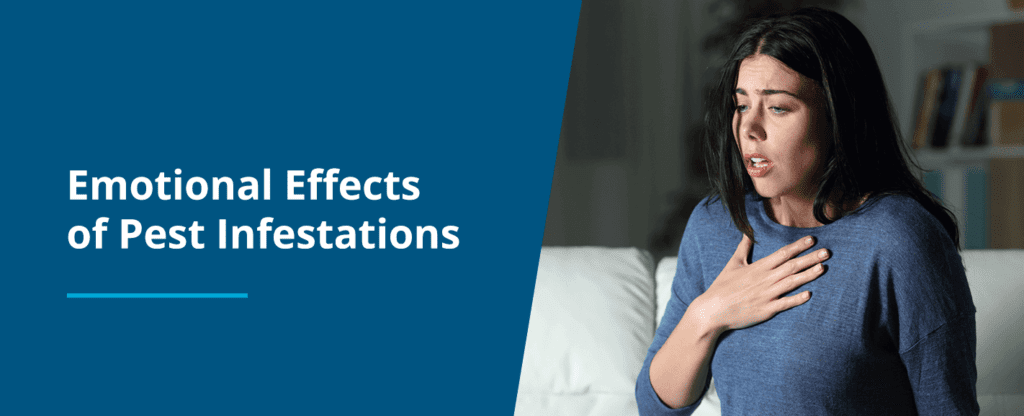
5. Feelings of Vulnerability
Pest infestations can evoke feelings of vulnerability, often stemming from a sense of invasion of personal space and a loss of control.
5.1 Sense of invasion of personal space
Your home is your sanctuary, a place where you should feel safe and secure. When pests invade this personal space, it can disrupt your sense of security, leaving you feeling vulnerable and exposed. The constant presence of pests can create a feeling of being watched or intruded upon, eroding your sense of privacy and comfort.
5.2 Loss of control
Dealing with a pest infestation can make you feel like you have lost control over your living environment. You may feel powerless against the pests and struggle to regain a sense of control. This loss of control can be distressing, especially for individuals who thrive on stability and predictability. The perceived inability to eradicate the problem on your own can compound feelings of vulnerability and insecurity.
5.3 Helplessness and vulnerability
The combination of a sense of invasion and loss of control can lead to feelings of helplessness. You may feel trapped in your own home, unable to escape the constant presence of pests. Helplessness can further contribute to feelings of vulnerability, leaving you with a heightened sense of unease and a diminished belief in your ability to handle the situation.
6. Social Isolation
Pest infestations can contribute to social isolation, leading to embarrassment, shame, and avoidance of social situations.
6.1 Embarrassment and shame
The presence of pests in your living space can be embarrassing and shameful. You might fear judgment or negative perceptions from others if they were to find out about the infestation. The stigma associated with pest problems can lead to feelings of embarrassment, causing you to avoid inviting others into your home and limiting social interactions.
6.2 Avoidance of social situations
The discomfort arising from a pest infestation may lead you to avoid social situations altogether. Fear of encountering pests or the worry of someone noticing signs of the infestation can make you reluctant to participate in social gatherings or invite friends and family over. This avoidance can isolate you from your support systems and exacerbate feelings of loneliness and social exclusion.
6.3 Impact on relationships
The psychological impact of a pest infestation can also strain relationships. You may feel reluctant to confide in others about your pest problem, fearing their judgment or avoidance. The burden of dealing with an infestation can create tension and conflict within relationships, leading to a breakdown in communication and emotional support.
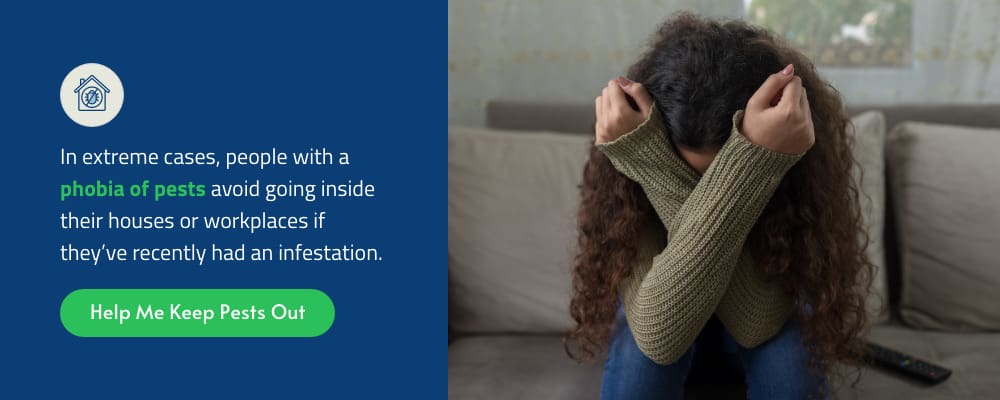
7. Obsessive-Compulsive Behaviors
Pest infestations can trigger obsessive-compulsive behaviors that revolve around cleanliness, checking for signs of infestation, and engaging in ritualistic behaviors.
7.1 Excessive cleaning and disinfection
The presence of pests can lead to an increased focus on cleanliness and hygiene. You may find yourself engaging in excessive cleaning and disinfection practices, striving to eliminate any traces of pests or their potential habitats. Cleaning rituals may become more frequent and time-consuming as you attempt to regain a sense of control and create a pest-free environment.
7.2 Compulsive checking for signs of infestation
Pest anxiety can drive compulsive checking for signs of infestation. You may constantly inspect your living space for evidence of pests, such as droppings, gnaw marks, or shed skins. This repetitive checking behavior is driven by the fear of the infestation’s persistence or resurgence. However, this constant vigilance can intensify feelings of distress and further contribute to obsessive thoughts and behaviors.
7.3 Ritualistic behaviors
Pest infestations can also lead to the development of ritualistic behaviors. These rituals may involve specific actions or routines performed in an attempt to prevent or ward off pests. For example, you may adopt rituals related to sealing cracks or checking bed linens before bedtime. Engaging in these behaviors gives individuals a perceived sense of control and offers temporary relief from anxiety, but they can often become time-consuming and disruptive to daily life.
8. Financial Burden
Dealing with a pest infestation can result in significant financial burdens, including expenses related to pest control measures, property damages, and repair costs.
8.1 Expenses related to pest control measures
Hiring professional pest control services or purchasing pest control products can incur substantial costs. The need for ongoing treatments, inspections, and preventative measures can stretch your budget and cause financial strain. Additionally, if the infestation has spread to neighboring properties, the collective costs of extermination and preventative measures can further exacerbate the financial burden.
8.2 Property damage and repair costs
Pests can cause extensive damage to your property, necessitating repairs and renovations. For instance, rodents may chew through electrical wiring, leading to potential fire hazards, while termites can cause structural damage to your home. The cost of repairing these damages can be overwhelming and may require significant financial resources.
8.3 Impact on financial stability
The financial burden associated with pest control and property damage can impact your overall financial stability. The unexpected expenses can disrupt your budget, leaving you financially vulnerable and increasing the stress and worry associated with the infestation. The added strain on your finances can further contribute to feelings of anxiety and impact your ability to address other essential needs and goals.
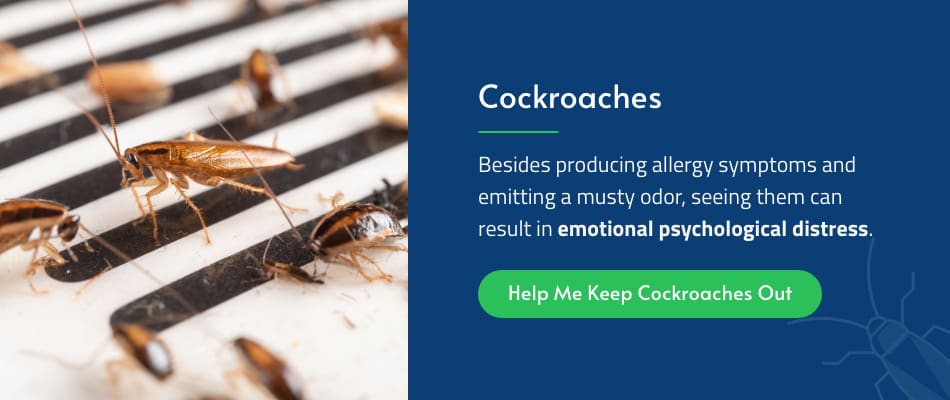
9. Impact on Mental Health
Pest infestations have the potential to significantly impact your mental health, increasing the risk of developing mental health disorders and exacerbating existing conditions.
9.1 Increased risk of developing mental health disorders
The stress, anxiety, and emotional distress experienced during a pest infestation can increase the risk of developing mental health disorders. Conditions such as generalized anxiety disorder, obsessive-compulsive disorder, and depression can be triggered or worsened by the psychological strain of the infestation. The constant exposure to negative emotions and the disruption of daily life can impair your mental well-being and require professional intervention.
9.2 Exacerbation of existing mental health conditions
If you already have a pre-existing mental health condition, a pest infestation can exacerbate your symptoms. The added stress and anxiety can intensify feelings of panic, despair, or obsessive thoughts, making it more challenging to manage your condition effectively. It is crucial to prioritize your mental health and seek appropriate support to address the additional challenges brought about by the infestation.
9.3 Emotional toll on overall well-being
The cumulative impact of fear, anxiety, stress, and other negative emotions associated with a pest infestation can take a significant toll on your overall well-being. The constant psychological strain can diminish your resilience, impair your ability to cope with everyday stressors, and overall lower your quality of life. It is essential to prioritize self-care and seek appropriate interventions to safeguard your mental health during this challenging time.
10. Adaptive Coping Strategies
While dealing with a pest infestation can be overwhelming, there are adaptive coping strategies that can help alleviate the psychological impact.
10.1 Seeking professional help
Seeking professional help from pest control experts can be crucial in effectively addressing the infestation and minimizing its psychological impact. Professionals have the knowledge, experience, and resources to tackle the problem efficiently, providing you with guidance and reassurance throughout the process.
10.2 Education and knowledge empowerment
Educating yourself about the pests infesting your home can help alleviate fear and anxiety. Understanding their behaviors, life cycles, and effective prevention measures can empower you to take appropriate action. Reliable sources such as pest control websites, literature, and advice from professionals can provide you with accurate information and practical solutions.
10.3 Emotional support and self-care practices
It is vital to seek emotional support from friends, family, or support groups to help navigate the psychological challenges of a pest infestation. Sharing your feelings, fears, and experiences with others who have gone through similar situations can provide validation and a sense of camaraderie. Additionally, prioritizing self-care practices such as relaxation techniques, exercise, and engaging in activities that bring you joy can help reduce stress and promote overall well-being.
In conclusion, the psychological impact of pest infestations should not be underestimated. Fear and anxiety, disgust and revulsion, sleep disturbances, stress and emotional distress, feelings of vulnerability, social isolation, obsessive-compulsive behaviors, financial burden, and impact on mental health can significantly affect individuals dealing with a pest infestation. It is crucial to address these psychological challenges through adaptive coping strategies and seek professional help when necessary to minimize the overall impact on well-being and regain a sense of control over your living environment.
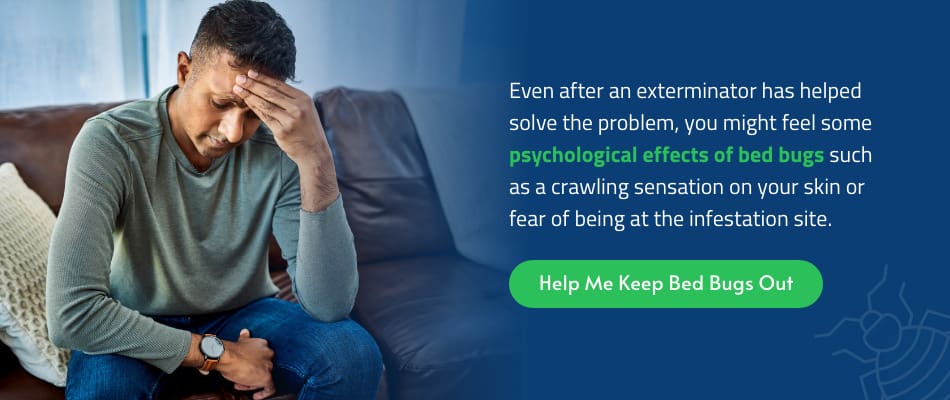

I am Randy, the author behind PestControld.com. Drawing from decades of experience, I aim to provide valuable insights, expert advice, and practical recommendations to help you make informed decisions when assessing viable pest control solutions.